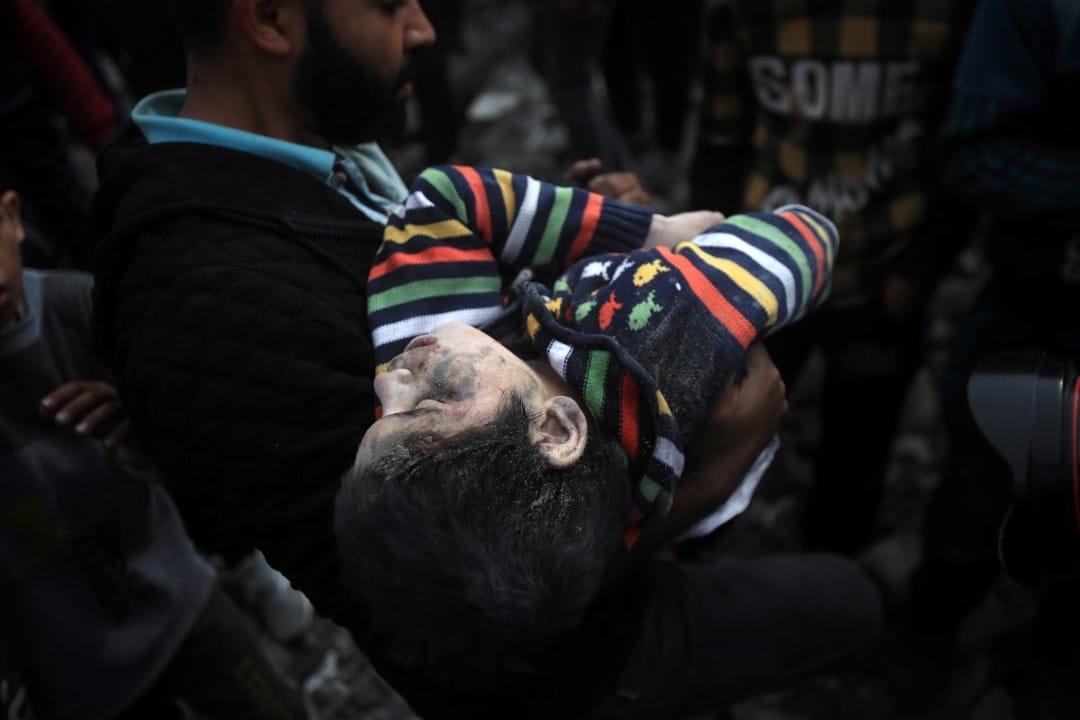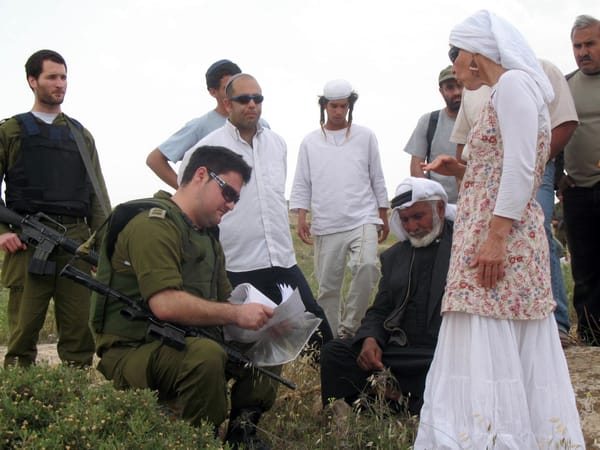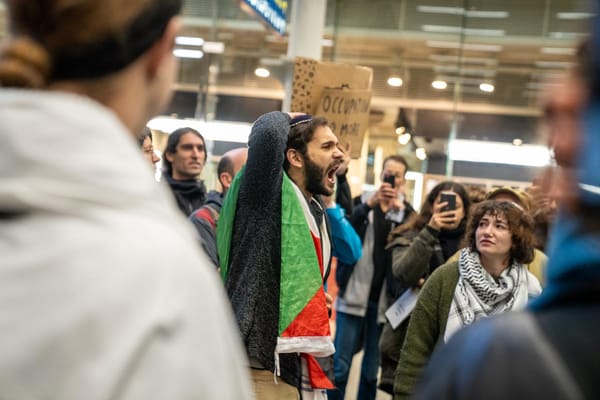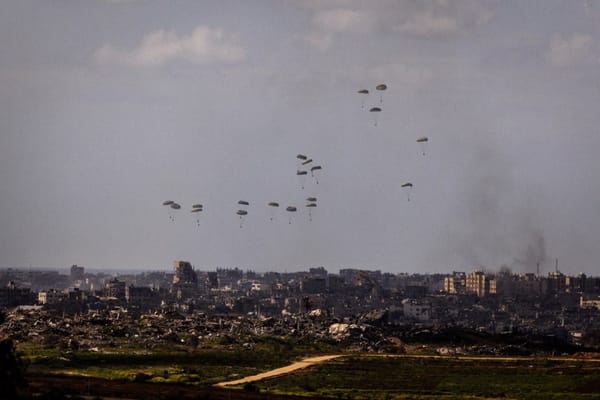Death and the Story
A new literary form emerges under genocide.

Every day, The Paris Review’s Instagram account posts a short quotation from their archives – usually excerpts of writers talking about themselves, their work and the creative process. These quotations often move me, and I give them a double tap, as if for luck. A while ago, they posted a line by Eudora Welty, a writer whom I had never heard of, but whose words spoke to me immediately: “Wherever you go, you meet part of your story.”
All through the summer, this seemed a sentiment endlessly true, but Welty’s trick hasn’t been working very well for me recently. Now, wherever I go, whatever I try to describe, I come back to Gaza, where I have never been.
Writers from Gaza have reason to laugh, perhaps to cry, at a statement like Welty’s, having long had little place to go, between the Mediterranean, the edge of the fence, and the next world. But still, there are no exceptions to Welty’s rule, and even (or especially) a prisoner sitting in his prison cannot escape being a writer, if he’s a writer.
If stories are indeed products of their writers’ environments, it will come as no surprise that the short story, with all the mastery of restraint that it requires, has established itself over the past few decades as Gaza’s most natural form of expression. After Israel started building the fence in the 1970s, writers had to get creative: how to get their handwritten scripts smuggled over the border, and safely delivered to the major publishing houses in Jerusalem and Cairo. To avoid being caught or lost in the operation, the ideal story was as slim and inconspicuous as possible. And as the fence got thicker and thicker, writers in Gaza learned to tighten and tighten their craft. It wasn’t long before the strip became known across the Arab world as “the exporter of oranges and short stories”.
One afternoon this November, on a day when it was pelting it down, I bought myself a small, grey book that was on display in the window of East Jerusalem’s Educational Bookshop, entitled The Book of Gaza. The back cover described it as a collection of 10 short stories from the strip, written between the seventies and the present, translated into English. At the time, reading The Book of Gaza seemed like the least I could do, but not once since then have I been able to bring myself to open it. I’m a big reader, but for the past few months I have been putting myself to sleep with the light of my phone. Like most people, I have been watching the genocide unfold before my eyes and in my hands. I haven’t had the patience or attention span for imaginary lands and things that haven’t actually happened. Instead I’ve been reading, watching, weeping over, letting my brain turn to rot over stories that aren’t real stories, stories in quotation marks, stories as shorthand for tapping and swiping, by which I mean, Instagram Stories. Instagram introduced Stories in 2016 as an import from Snapchat, the premise being that the uploaded photograph or video lasts for no more than 24 hours. There are a number of ways to preserve a Story, but you have to know how and you have to be quick. And if you want them to stay just a moment longer, you have to press them with your fingers, like a magical amulet, or a human pulse.
Of the Stories I have watched over the past five months, the vast majority are all but lost. I just have the vague memory of an image of a limb growing out of a rock, buildings that are no longer buildings, a girl called Susu with watering eyes, the screenshot of the face of a woman my mother’s age with holes where the eyes should be. And there was “rooh il rooh”: the Story where nothing really happened, except that a grandfather whispered a biblical superlative into an ear to which sound had come to mean nothing.
Representing South Africa at the ICJ in January, Blinne Ní Ghrálaigh referenced the use of social media when declaring that the people of Gaza “are broadcasting their own genocide in real time”. But as well as using the Instagram Story as the primary means of reporting from the ground, Gazans have managed to establish it as a literary form in its own right. Needless to say, the question of literary and artistic production in Gaza is not the most pressing one right now. But it is precisely the imminent, ceaseless possibility of death that has forced into being a brand new variation of the short story, or rather, its rawest crystallisation: the Gazan Insta story.
Where writers from Gaza once made do with the bare minimum for their materials, now they make do with literally nothing at all. After all, a Story should not technically be feasible in the context of zero electricity and near-constant blackouts. The Story is made of lack of time, lack of space, peace, quiet, food and water, it is made of all things that are, perhaps, the opposite of art. This is a form eminently of grief, the cry of a person who has cried themselves out of breath, and yet still finds a way to carry on crying. On 24 January, international award-winning Gazan poet Mosab Abu Toha posted to his story a simple question, “Hello … Can you help?”, and then a couple of hours later, “Just one word”. As much as this is a practical request posed to the outside world, its earnestness is full of the knowledge that it is rhetorical, and fantastical, and tragic – that help will not be on the way.
Still, Stories do not qualify as “proper literature”, it may be said; they are just something to do in the meantime, before the bombing stops and it’s possible to sit outside in the sun and read again. But literature has never claimed to be anything more than a temporary substitute, a handy stand-in for the wonders and the terrors of real experience. In this sense, the Story is about as pitifully inadequate a form as Greek tragedy when it comes to conveying the full truth of pain and suffering.
If literariness has something to do with being subtle and complex, the Stories coming out of Gaza are not less but more literary for their functionality, their confronting immediacy, and their fundamental transience. It is difficult to think of a more excruciatingly perfect example of a form so absolutely economic, so completely at one with its content. Writing becomes just another thing that hurts: “my heart, my mind, my soul, my language ache me” writes Abu Toha on 29 January. Like some horribly clever poem, the Insta Story, in the hands of Gazans, becomes indistinguishable from the very scenes of massacre it captures, dying in time with them, as if in solidarity, or out of pure despair, it will suffer their tragedy: it is an elegy in action, an evanescent form for a people forced into evanescence.
It should be made clear that such Stories, however literary, cannot constitute the remotest flicker of consolation in the context of genocide. They are a far, far cry from consolation, or even from “a sad and angry consolation”, in poet Geoffrey Hill’s phrase. Palestinian literature has long known that it’s a little bit different, that it can’t afford the same comforts and luxuries as everyone else. I first read Noor Hindi’s poem, “Fuck Your Lecture on Craft, My People Are Dying”, during the last war, on Instagram, probably via a Story, in which she wishes she could be “one of those poets who cares about the moon” before explaining that regretfully, she can’t, on account of the fact that “Palestinians can’t see the moon from jail cells and prisons”. Likewise Marwan Makhoul walks us through the logic of his theme: “In order for me to write poetry that isn’t political/ I must listen to the birds/ and in order to hear the birds/ the warplanes must be silent.” And it strikes me that Palestinian literature often advises me to silence. The other morning I happened on a Story of the poet Mohammed El-Kurd, speaking at PalFest in London last December: “A lot of people have been talking about Gaza. Most of these people are writing their essays and articles in expensive houses and on expensive couches next to windows not blistered by white phosphorus. Their chandeliers never shake to announce a building’s final throes, nor do these writers ever Sharpie their children’s names on their children’s arms in case of unexpected rubble.”
El-Kurd insists that this “detail is not minor”: that there is a reason why nobody has ever had to be as good as Palestinians at killing their darlings, why there’s no time in Gaza for long walks and extended metaphors, why emotion has to be conveyed through a thousand pixels or so, through a blurry image of a mass grave, through a typed row of cartoon broken hearts, why Palestinian literature has come to consist of images of hands leafing through destroyed copies of the Qur’an.
The Insta Story represents the culmination of this existing literary apartheid, where some writers get to write all the beautiful and complicated words, while those in Gaza may only dream of them. On 23 November, journalist Plestia Alaqad posted a page from an old diary dated 3 September 2019, in which she records a holiday to Europe with her friend Nour. Tucked under a paperclip, there’s a polaroid of two young women crouching and smiling in front of an old, medieval-looking tower, with a fairytale turret and a stained-glass window. Summing up the trip, in what now reads in a painfully improbable conditional tense, Plestia quotes Nour, who may or may not still be alive, remarking, “It’s something I’d write about”.
*
It begins like a story. On the final day of October last year, my friend came round with a couple of face masks, which he swore would change my life, and we had literally just placed slices of cucumber over each other’s eyes, when we received the news that Khalil Abu Yahiya, along with his wife and two young daughters, had been killed in an Israeli airstrike. I am not the best person to write about Khalil, whom I had only met once or twice through a screen. But I remember that he had smiled when I told him that I had studied literature too. I found out in the outpouring of eulogies to him in the days and weeks following his death that he had liked to describe himself as a “poet without poems”, which I knew at once to be a phrase of infinite beauty.
Three months on, I came across some notes I had taken from a speech Khalil gave over Zoom just two weeks prior to his death. I had quoted him as he conducted an imaginary conversation with Israel: “Go to Sinai temporarily.” “No, I know what temporarily means.” Next to that I had drawn an extravagant doodle of the word Gaza, with all sorts of leaves and flowers coming out of it. I posted a picture of the page to my Story, some people saw it, and then after a while they couldn’t. ▼
Kate Greenberg is an editor at Vashti.




